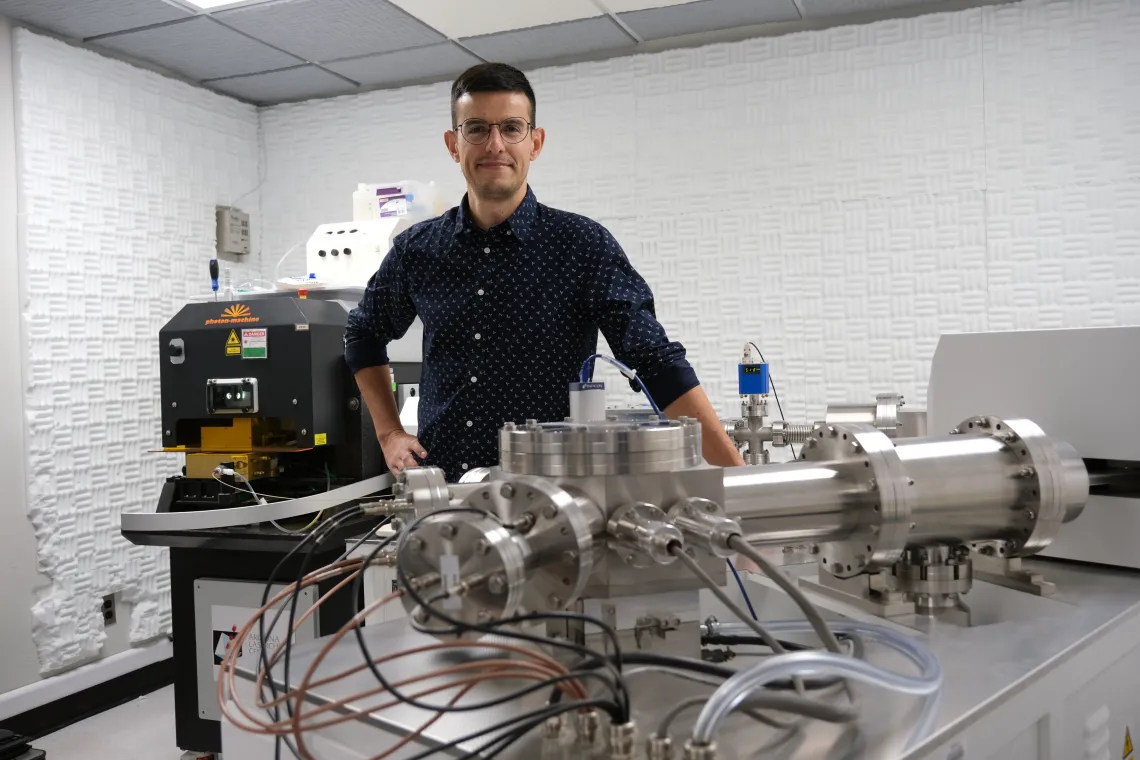Dr. Mauricio Ibañez-Mejia Receives NSF MRI Grant for Multicollector ICP-MS

Dr. Mauricio Ibañez-Mejia in the Department of Geosciences at the University of Arizona received a National Science Foundation Major Research Instrument Program grant funding a multicollector inductively coupled plasma mass spectrometer (MC-ICP-MS), which combines the advantages of superior ionization offered by a plasma source with the accuracy and precision of a magnetic sector multicollector mass spectrometer. It is an extremely powerful technique for high precision isotope ratio analysis of liquid and solid samples in the fields of geosciences, planetary sciences, nuclear safeguards, environmental sciences, and metallomics. Mauricio’s co-PIs on this award are Dr. George Gehrels in the Department of Geosciences and Dr. Jessica Barnes in the Lunar and Planetary Laboratory.
"Breakthroughs in geochemistry applied to Earth and planetary science research go hand-in-hand with technological advances in analytical instrumentation," said Dr. Ibañez-Mejia. “Isotope geochemistry is a rapidly evolving field, and continued improvements in the precision, accuracy, and sensitivity offered by latest generation multicollector ICP-MS instruments are enabling discoveries that were simply out of reach only a decade ago. Acquisition of this next-generation instrument is a complete game-changer for the research we conduct in the Department of Geosciences, and we are very grateful for the support we have received from the NSF-MRI program and UArizona to make this a reality.”
The new instrument will be housed within the Arizona LaserChron Center (ALC), an NSF-supported multi-user Community Facility at the UArizona, and co-managed between ALC and the Arizona Heavy Isotopes Laboratory (AHIL), for which Mauricio serves as co-PI and PI, respectively.
Dr. Ibañez-Mejia's research interests are in the application of geochemical techniques, particularly isotope geochemistry, to understand high-temperature processes influencing the evolution of the solid Earth. His research combines the use of radiogenic isotope systems such as U-Pb geochronology to determine times and rates of igneous and metamorphic processes, with geochemical tracers such as radiogenic and stable isotopic compositions to better understand petrologic and tectonic processes in a robust temporal framework.
Mauricio joined the UArizona faculty in 2021 after completing an undergraduate degree in geology at the Universidad Nacional de Colombia in Bogotá, M.Sc. and Ph.D. degrees in geosciences at the University of Arizona, a W.O. Crosby postdoctoral fellowship at MIT-EAPS, and a four-year appointment as assistant professor at the University of Rochester. He was a featured speaker in the 2022 College of Science Minerals Lecture Series, exploring ‘The Stories That Minerals Tell’ and how minerals can be utilized to reconstruct the timescales of our planet.
"The new MRI award will allow the acquisition of the last generation MC-ICP-MS which will advance our research enterprise by providing a unique opportunity to students and faculty for cutting edge science and experiential learning," said Dr. Barbara Carrapa, Professor and Department Head of Geosciences at UArizona. "The Department of Geosciences is grateful to NSF for this opportunity and feels lucky to have Dr. Mauricio Ibañez-Mejia as part of our faculty and a rising star in the field of petrochronology and cosmochronology."
With the support of the National Science Foundation, the Major Research Instrumentation (MRI) Program serves to increase access to multi-user scientific and engineering instrumentation for research and research training in our Nation's institutions of higher education and not-for-profit scientific/engineering research organizations. An MRI award supports the acquisition or development of a multi-user research instrument that is, in general, too costly and/or not appropriate for support through other NSF programs. MRI provides support to acquire critical research instrumentation without which advances in fundamental science and engineering research may not otherwise occur. MRI also provides support to develop next-generation research instruments that open new opportunities to advance the frontiers in science and engineering research. Additionally, an MRI award is expected to enhance research training of students who will become the next generation of instrument users, designers, and builders.
Through the College of Science's own linkage - including studies in the life and molecular sciences, earth and environmental sciences, physics and space sciences, mathematics and computational sciences and cognitive sciences - and its external connections to national and international institutions and organizations, students and faculty at the College of Science have access to interdisciplinary resources that can readily address the multi-faceted issues facing society. By preparing students to understand the complexity of scientific research, faculty at the College of Science strengthen their knowledge and understanding of their disciplines in relation to others. Through the nurturing and development of effective partnerships and collaborations, the College of Science is able to share its passion for research and pursue solutions that impact society on many different levels.

